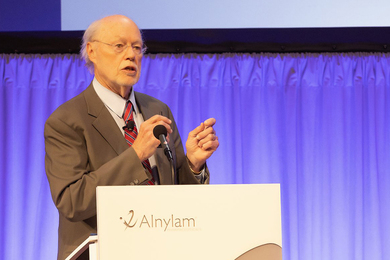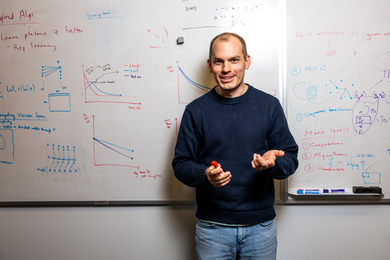When he arrived from Princeton University three years ago, political science MIT Professor Evan Lieberman was determined to find new and engaging ways of presenting course content. “I wanted to understand the students here, figure out what materials would interest them, and make a teaching impact,” he says.
One result of his efforts was 17.571 (Engineering Democratic Development in Africa). Offered for the first time in spring 2017, the class gives students the chance to apply engineering thinking to challenges in the practice of democracy in different African nations.
But now Lieberman, the Total Chair on Contemporary Africa, is taking instructional innovation to an entirely new level — and to new audiences. His new course, Democracy and Development: Perspectives from Africa, is the first MIT Political Science class produced exclusively for edX, the multi-university online education platform.
“I’d always been interested in technology, and wondered if there was a way to use the opportunity of a MOOC [massive open online course] to share ideas and to generate broad discussion on the issues important to my research,” Lieberman says. So in 2015, he eagerly responded to a call for proposals from MITx, the Institute's online learning division, which works with the larger edX program.
His seven-week course, which launches Sept. 26, will introduce students from around the world to the drivers of democratic development in contemporary Africa. Lieberman has tailored his approach to online learners who might lack knowledge of Africa and its political institutions, but who are nevertheless curious about the promise and problems of democratic politics in Africa and elsewhere.
In developing the course, Lieberman says his first thought “was to make sure that lots of African voices get incorporated.”
“I can’t hide the fact that I’m a white American teaching about Africa — hopefully a sensitive one — and I felt it was important that students hear directly from Africans themselves,” he says.
Guided by a syllabus tackling topics such as the legacy of slavery and colonial rule, accountability and service delivery, human rights and the judiciary, and digital tools of democracy, Lieberman set out to interview a range of key players in African nations where democratic political institutions have taken root in the past few decades.
With funding from both MITx and the Center for International Studies, he recorded conversations with more than 50 African academics, politicians, leaders and students, who highlight key ideas and frame case studies intended to spur online discussion.
For instance, one module (the term for an online class) showcases a panel interview with three attorneys from a leading South African law firm. They discuss the legal recourse available to ordinary citizens who are legally entitled to but denied such public goods as land, housing, and education.
“We look at the ways law firms and other public actors use courts to challenge the government when government fails to deliver on constitutionally-mandated rights,” says Lieberman.
Each module consists of short video segments, ranging from four to 18 minutes long, which include interview clips and portions of Lieberman’s lectures where he distills key points from the interviews and frames larger questions intended to prompt lively online discussions.
“I’m excited to see what people have to say, whether they think the arguments they hear are plausible,” he says. “I will encourage students to provide examples from their own nations, when they can, and think about how politics can be helpful in leading to positive outcomes for people.”
In addition to these discussions, Lieberman is incorporating quizzes and short writing assignments to ensure that his online audience is digesting not just the video clips, but also the reading assignments. He hopes that such rich content will appeal to learners no matter where they live.
“There are universal concerns about how people come together to make decisions such that everyone feels they are more or less respected and that that the rules of the game are fair,” he says. “The course is about Africa, where there are specific challenges to democratic government, but the questions and ideas that arise are relevant in any political context.”
Given the frequent caricatures of “African strongmen and obedient followers,” he notes that Americans in particular “will be amazed by how thoughtful and sophisticated are the wide range of political actors in Africa, who are innovating in democratic government.”
After nearly 18 months of storyboarding, production, and editing — “the equivalent of preparing for three courses,” he says — it will soon be launch time. At last count, over 700 students from more than 100 countries had enrolled.
Lieberman says he has every hope that this “huge undertaking” will live up to his expectations and become, for a community of online learners, “an immersive experience where they can explore materials in a self-paced way, think hard about important questions, and pursue them after the course is over.”







